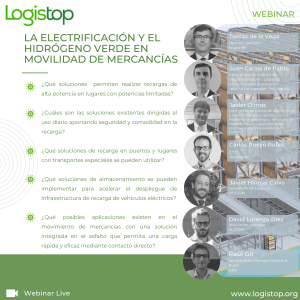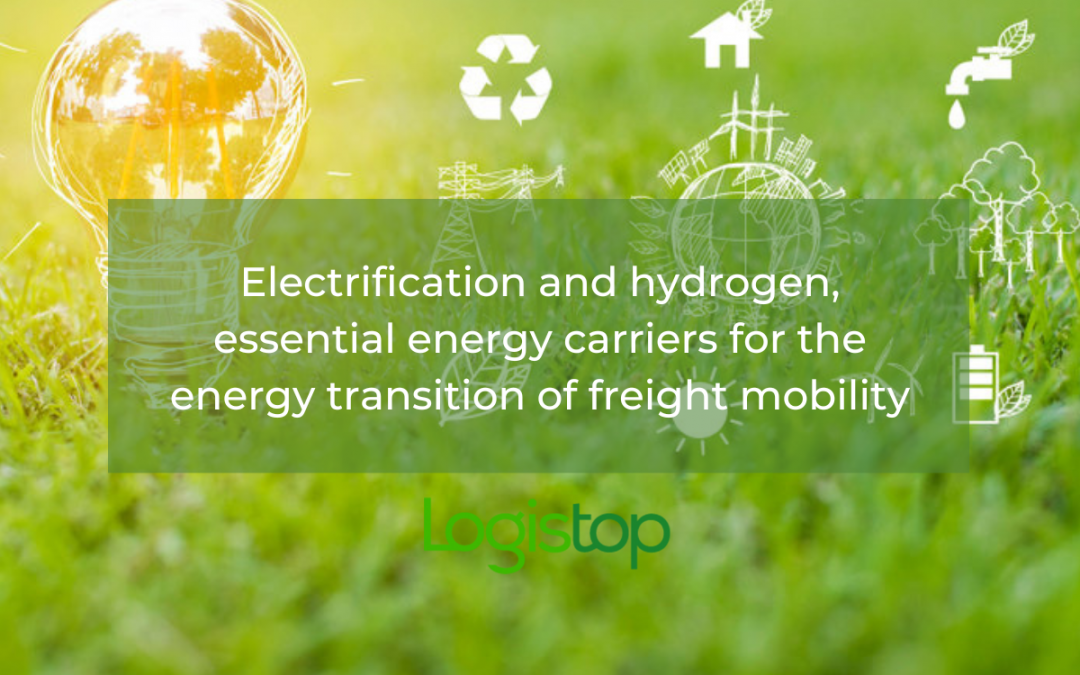- What solutions will be key to cities’ commitments to the decarbonisation of transport?
- Pollution and noise, the main challenges of decarbonisation in the port sector.
- The emergence of BEV technologies represents a great opportunity to address the challenges of the energy transition.
- The reuse of second-life batteries guarantees the sustainability of the electrification of transport.
In the Logistop Webinar “Electrification and green hydrogen in freight mobility”, a series of solutions were presented that are enabling an increasingly competitive recharging infrastructure in terms of time, ease of use and safety. These solutions will enable logistics to play an active, dynamic and transforming role in order for the economy as a whole to reach a zero-emissions paradigm in the medium to long term.
To analyse these issues we have had the participation of Juan Carlos de Pablo, leader of the decarbonisation working group at Logistop, Managing Partner at Ecoinversol and Innovation Manager at FM Logistic, Javier Olmos, leader of the digitalisation and automation working group at Logistop and Head of Strategy and Business Development, industrial, digital and electromobility solutions, R&D at CARTIF, Carlos Pueyo Rufas, CTO, BeePlanet, Javier Hinojal Calvo, Business Developmen, and David Lorenzo Diez, Innovation Manager, Alstom, Raúl Gil, Service Sales Manager Marine & Ports, ABB, as well as with the presentation and moderation of Tomás de la Vega, Managing Director, Logistop.

To introduce the topic to be discussed, Juan Carlos de Pablo analysed how electrification and hydrogen are essential elements to address the energy transition of freight mobility and how they allow the articulation of projects without emissions or local pollutants. He highlighted the significant potential for cost reduction that the implementation of battery electric and hydrogen vehicles implies.
“Electrification and hydrogen are essential energy carriers for the energy transition of freight mobility and have a high cost reduction potential”
Juan Carlos de Pablo, leader of the decarbonisation working group at Logistop, Managing Partner at Ecoinversol and Innovation Manager at FM Logistic
Javier Olmos indicated that the main challenges to be overcome with regard to electric vehicles can be grouped into two types of barriers to entry. On the one hand, there are the barriers linked to costs, such as the operational cost or the price of the vehicle; and, on the other hand, the operational and infrastructure barriers, such as the lack of charging infrastructure or charging time.
“The emergence of BEV technologies is a great opportunity to address the challenges we face, as well as to enable us to bring a stable product to the market”
Javier Olmos, leader of the digitalisation and automation working group at Logistop and Head of Strategy and Business Development, industrial, digital and electromobility solutions, R&D at CARTIF
Use of second-life batteries from electric vehicles for charging infrastructure
Next, Carlos Pueyo stressed the importance of being aware that this economic, sustainable and energy transition that is being proposed has to be done with common sense and should not pay a higher toll when making the transition to this type of vehicle. In this sense, Carlos emphasised the importance of the second life business model, a process for which a series of regulations are being developed at European and national level that will regulate the reuse of second life batteries and whose process is currently being carried out by expert actors.
“The second life business model closes the circle of this process because, from batteries from electric vehicles, electric vehicles are powered and their deployment is encouraged and, in addition, their batteries will then be reused in stationary storage systems”
Carlos Pueyo Rufas, CTO, BeePlanet
Rapid ground contact charging system, SRS (Stationary Recharge System)
For their part, Javier Hinojal and David Lorenzo presented to the audience the product they have developed under the name SRS (Stationary Recharge System), aimed at charging by opportunity or linked to the operation, with a clear multimodal, scalable and optimisable vocation. To explain its adaptability and use, David showed the PALOMA Project, a pilot carried out with an electric bus in Malaga which they adapted by implementing the aforementioned SRS system.
As Javier and David pointed out, this type of system facilitates the integration of the chargers, does not add obstacles and improves the autonomy of the vehicle, which only needs to stop for a complete recharge. This is why this solution will be key to cities’ commitments to the decarbonisation of transport.
“In the digital world in which we find ourselves, anything that is not automatic will be difficult to maintain over time, in other words, anything that involves extra activity will not be successful”
Javier Hinojal Calvo, Business Development, Alstom
Decarbonisation in ports. Electrical connection to ships
Finally, Raúl Gil introduced the point of view from the port area, where there is a need for decarbonisation due to regulatory issues such as the reduction of pollution and noise in ports.
To this end, as Raúl analysed, an electrification solution is available that is based on shore connection, the electrical connection to ships. He also points out that there is a specific regulation that defines and standardises these solutions according to the type of ship.
“In order to tackle the existing problems in the decarbonisation of the port sector, at European level and with 2030 as the target date, it is intended that large vessels, when berthed, should be electrically connected to the quayside”
Raúl Gil, Service Sales Manager Marine & Ports, ABB
About Logistop
Logistop is the benchmark workspace for collective innovation through the realisation of projects hand in hand with our members. Transforming the entire supply chain into a more efficient and sustainable one. All this with the aim of articulating and carrying out innovation projects among the members, without excluding the possibility of collaborating with or receiving support from certain organisations outside Logistop.

